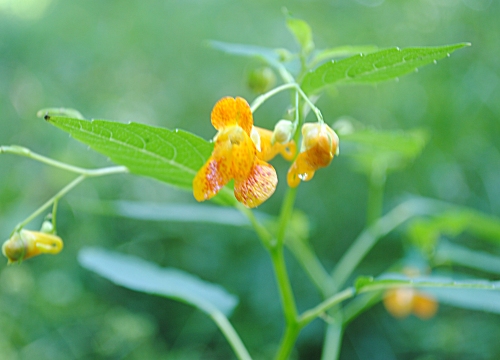Prickly Ash, Red Clover, and Jewelweed
Monday, July 12th, 2010I’ve been itching to get out to do some foraging, but wasn’t willing to brave the heat and humidity of last week. Finally, at a tolerable 85 degrees, I gathered my courage and went for a walk. Grabbing a water bottle, camera, and my gathering basket I headed to the meadow first to check on the Prickly Ash.

I first discovered the Prickly Ash (Zanthoxylum americanum) last summer. After reading up on it, I’ve been looking forward to trying my hand at making some bitters with it. I also learned that the dried berry husks are known as Szechuan Pepper used in Asian cooking. The berries are oily with a strong spicy citrus scent. I learned the hard way to taste very carefully. Chewing on these little guys results in a tingly numbing sensation that takes a little while to wear off. Thus one of the nicknames for this shrubby tree, “toothache tree“. Another use for Prickly Ash that I’m interested in exploring is as an herbal remedy for arthritis. Picking the berries was a little tedious. They are very small, so I had to take my time and also avoid the nasty sharp thorns running up and down the branches. If you look at the photo above, you can see a shadowy silhouette of one of the thorns in the middle of the cluster of berries.
Next, I moved on through the meadow, heading for a neighboring field where there is always plenty of red clover. I snapped some pictures along the way.
This is purple coneflower (Echinacea purpurea) that escaped on of the flower beds at the house and naturalized in the field. I’ve been leaving it alone, giving it the chance to spread before I attempt to harvest any. It has doubled since last year, and if it doubles again I may be comfortable taking a little next fall.
There were butterflies everywhere. I was able to capture this small Meadow Fritillary sunning itself on some Canadian Thistle seed heads.
Tansy is another escapee from my gardens, and has been invading the meadow at a rather alarming pace over the last couple of years. This is one that I wish would slow down. After arriving at the red clover, I quickly gathered a basket full.
The reason I’ve been a little desperate to get my hands on a good supply of red clover is because I’m one of “those” slightly insane middle aged women who could use some help. Red clover has long been used by herbalist for a variety of conditions. My main interest lies in what some modern studies are suggesting in regards to the isoflavones (some of which have estrogen like properties) found in red clover. Believe me! The guys in my household are all on the band wagon for my experimenting with red clover tea. It’s their fervent hope that they may get some relief from the craziness brought on by this particular phase in my life.
When I was composing this particular picture, I was so focused on the bloom that I never noticed the little insects. It was a pleasant surprise to find these little hitchhikers when I was editing the photos. While picking the clover I made a rather disturbing observation. Here I am in this huge field full of clover and I never saw a single honeybee. My husband and I used to be hobbyist beekeepers. We gave it up a few years ago due to time constraints. It wasn’t too long after that we started hearing about colony collapse disorder. Just last year this field was humming with honeybees. Not good!
I saved foraging the Jewelweed for last, because it was going to involve venturing into the woods. I wanted to be in and out of that place as quickly as possible, because I knew I was going to be eaten alive by mosquitoes. There isn’t a bug-off potion in the world that can deal with the clouds of little blood suckers inhabiting my woods right now. I wasn’t wrong.
Spotted Jewelweed (Impatiens capensis) is the variety growing in my woods. I wanted to make a couple of different types of poison ivy treatments from the plant so I can decide which one I like the most. Jewelweed ice cubes and an infusion in vinegar. The next time I pick up some poison ivy I’ll let you know which remedy worked the best for me.








